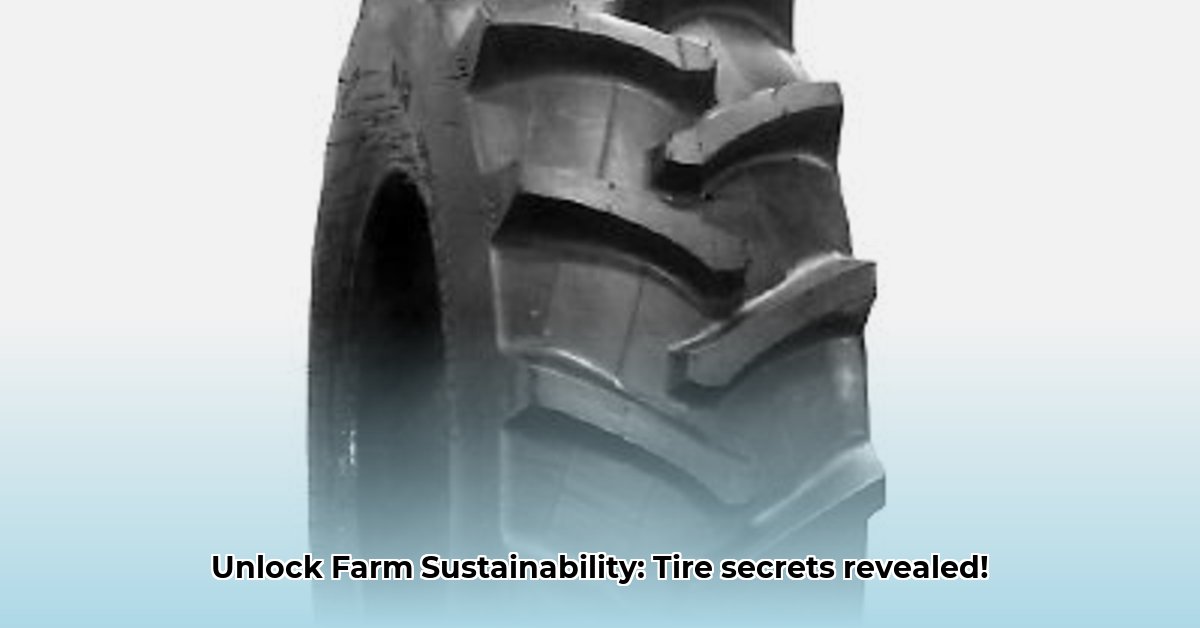
18.4 R30 Tractor Tires: Your Key to Sustainable Farming
Choosing the right tractor tires is more than just a purchasing decision; it's a foundational element of sustainable and profitable farming. This guide focuses on 18.4 R30 tires, a popular size, and details how selecting them appropriately can significantly benefit your farm's efficiency, environmental impact, and bottom line. We'll explore everything from optimizing tire pressure to understanding the long-term benefits of sustainable tire choices, providing practical advice for farmers of all experience levels. For more in-depth information, check out this helpful resource on 18.4 R30 tires.
Understanding the Impact of Tire Choice on Sustainability
The implications of tire selection extend far beyond simple functionality. Incorrect tire choices can lead to soil compaction, increased fuel consumption, and reduced crop yields – all detrimental to both profitability and environmental responsibility. Conversely, a thoughtful selection process paves the way for improved soil health, enhanced operational efficiency, and reduced environmental footprint.
Think of your tractor tires as the interface between your machinery and the soil. Proper tire selection ensures a gentle and efficient interaction, maximizing yields while minimizing environmental damage. Don't your crops deserve the best possible support?
Larger tires, such as the 18.4 R30, generally distribute weight more evenly, reducing soil compaction. This leads to better water absorption, healthier soil microorganisms, and ultimately, healthier plants and improved yields. "The improved water retention associated with reduced compaction can significantly contribute to lower water usage," says Dr. Emily Carter, Soil Scientist at the University of California, Davis.
18.4 R30 Tractor Tires: A Detailed Examination
The 18.4 R30 tire size is a popular option for many farmers due to its versatility and performance across various farm operations. These tires often come with a 12-ply rating, indicating robust construction and extended lifespan. This inherent durability translates directly into reduced tire replacement costs and less waste, making them a sustainable choice within the agricultural context.
Choosing the Right Tires: Key Factors to Consider
Several factors significantly influence the optimal tire selection for your specific needs:
Soil Type: Different soil types (e.g., sandy loam, clay) react differently to tire pressure and require unique considerations. Clay soils, for example, are especially susceptible to compaction and require careful management of tire pressure.
Terrain: The topography of your fields impacts tire selection. Steeper slopes necessitate tires with superior traction to prevent slippage, while flatter fields may permit slightly less aggressive tread patterns.
Tractor and Implement Weight: The combined weight of your tractor and implements is crucial when sizing your tires. Underestimating the load can lead to premature tire wear and, critically, safety risks. Always ensure your tires are rated for the maximum anticipated weight.
Maintaining Your 18.4 R30 Investment: A Practical Guide
Proper tire maintenance is essential for maximizing lifespan, performance, and minimizing environmental impact. Key maintenance practices include:
Regular Pressure Checks: Consistent monitoring and adjustment of tire pressure are paramount. Underinflation leads to increased soil compaction and fuel waste, while overinflation can damage both tires and rims.
Tire Rotation: Periodic tire rotation ensures even wear across all tires, prolonging their lifespan and maximizing performance.
Prompt Repair of Damage: Addressing punctures or damage immediately prevents escalation of issues, decreasing the likelihood of premature tire failure and avoidable replacement costs.
The Sustainability Angle: Environmental Advantages of 18.4 R30 Tires
Sustainable farming practices emphasize long-term viability and environmental stewardship. Investing in high-quality, durable tires, such as the 18.4 R30, directly supports these goals. Their extended lifespan reduces waste associated with frequent replacements, lower fuel consumption due to reduced slippage, and minimizes your farm's overall environmental impact. Remember that responsible tire disposal at the end of their life is also a critical consideration.
Beyond the Tires: A Holistic Approach to Sustainable Agriculture
Choosing the appropriate tires is a crucial step, but it's only one component of a comprehensive sustainable farming strategy. Integrating other best management practices (BMPs) further amplifies the positive environmental and economic effects. These BMPs include:
- Crop Rotation: Maintaining soil health through diversification of crops.
- No-Till Farming: Minimizing soil disturbance and promoting soil health.
- Cover Cropping: Protecting soil from erosion and nutrient depletion.
These practices, coupled with careful tire selection, create a synergistic effect, dramatically enhancing farm sustainability.
Looking Ahead: Future Trends in Agricultural Tires
Technological advancements continue to shape the agricultural tire industry. Expect to see new materials and designs focusing on even further reductions in soil compaction and improvements in fuel efficiency. Staying informed about these innovations will help you optimize your farming practices for maximum sustainability.
Investing in high-quality agricultural tires is a strategic investment in your farm's long-term health and profitability. It's a commitment to responsible land stewardship and the foundation for a successful and sustainable farming operation.